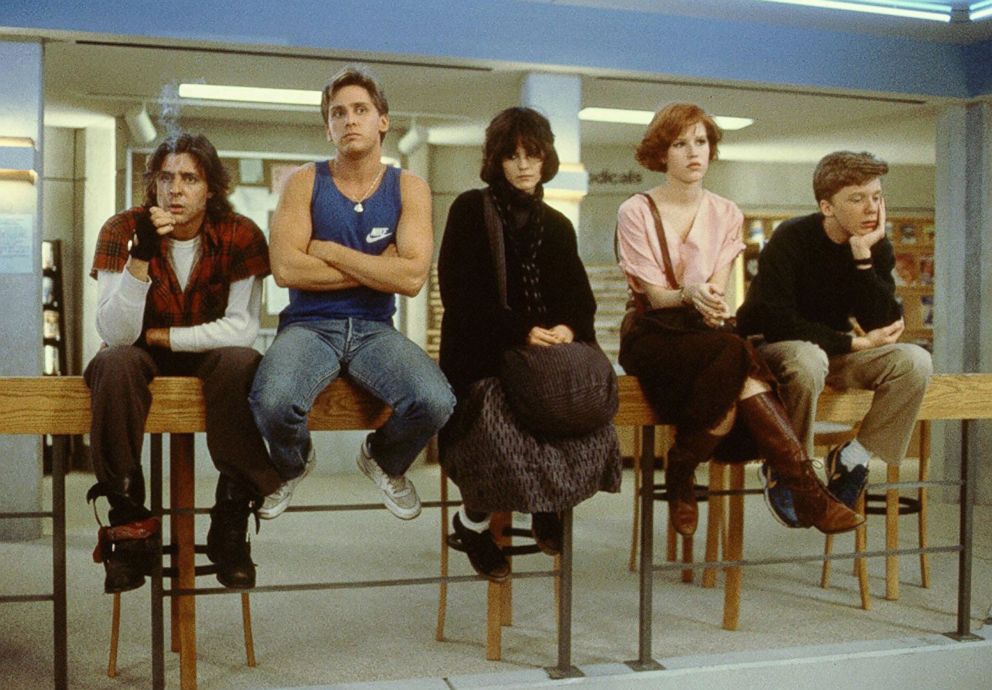Molly Ringwald calls 'The Breakfast Club' 'troubling' after rewatching with her daughter
Molly Ringwald wrote that John Hughes' film doesn't hold up in the #MeToo era.
"The Breakfast Club" star Molly Ringwald is sounding off about her iconic 1980s film, writing in a recent New Yorker op-ed that many scenes don't hold up -- especially after the #MeToo movement has shed more light on sexual harassment issues that permeate our society.
In her essay, Ringwald, 50, recalled feeling uneasy when her daughter asked to watch the 1985 John Hughes' film with her, "but my daughter insisted that her friends had already seen it, and she said she didn’t want to watch it for the first time in front of other people," she wrote.
"The Breakfast Club" centers on five high school students, who meet while serving a Saturday detention. Ringwald portrayed the high school sweetheart, Claire.
"When my daughter proposed watching 'The Breakfast Club' together, I had hesitated, not knowing how she would react: if she would understand the film or if she would even like it," Ringwald wrote. "I worried that she would find aspects of it troubling, but I hadn’t anticipated that it would ultimately be most troubling to me."

Ringwald wrote, "If attitudes toward female subjugation are systemic, and I believe that they are, it stands to reason that the art we consume and sanction plays some part in reinforcing those same attitudes."
"At one point in the film, the bad-boy character, John Bender [played by Judd Nelson], ducks under the table where my character, Claire, is sitting, to hide from a teacher," Ringwald continued. "While there, he takes the opportunity to peek under Claire’s skirt and, though the audience doesn’t see, it is implied that he touches her inappropriately."

"We kept watching ... but I kept thinking about that scene," the actress continued, adding that the scene made her think of the numerous women who came forward, claiming they were sexually harassed, assaulted and raped by Harvey Weinstein, which later birthed the #MeToo movement.
Weinstein, 65, has admitted to wrongdoing and sought professional help, but a spokeswoman for him has told ABC News previously that "any allegations of non-consensual sex are unequivocally denied by Mr. Weinstein."
In her lengthy essay, Ringwald also writes of the "symbiotic relationship" she had with writer and director, Hughes. The iconic filmmaker, whose films include "Ferris Bueller's Day Off" and "Pretty in Pink," died in 2009. He was also responsible for the film that made Ringwald famous, 1984's "Sixteen Candles."
How are we meant to feel about art that we both love and oppose?
Still, she recalled a time when she pushed for Hughes to cut a particularly insensitive scene, which she described as having " a residue of crassness."
"In the shooting script of 'The Breakfast Club,' there was a scene in which an attractive female gym teacher swam naked in the school’s swimming pool as Mr. Vernon, the teacher who is in charge of the students’ detention, spied on her," Ringwald wrote. "The scene wasn’t in the first draft I read, and I lobbied John to cut it. He did, and although I’m sure the actress who had been cast in the part still blames me for foiling her break, I think the film is better for it."
Ringwald also pointed out how Nelson's character, Bender, "sexually harasses Claire throughout the film."

Concluding, however, Ringwald praises Hughes then poses this question:
"How are we meant to feel about art that we both love and oppose? What if we are in the unusual position of having helped create it? Erasing history is a dangerous road when it comes to art -- change is essential, but so, too, is remembering the past, in all of its transgression and barbarism, so that we may properly gauge how far we have come, and also how far we still need to go," she wrote.
"The conversations about them will change, and they should. It’s up to the following generations to figure out how to continue those conversations and make them their own -- to keep talking, in schools, in activism and art—and trust that we care," Ringwald concluded.




